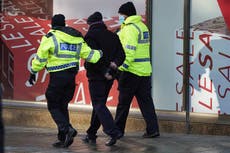Put travellers in hotels to curb spread of new coronavirus variants, says key adviser ahead of crunch meeting
‘It’s up to the government to decide whether they think the imposition is worth the benefits’
Your support helps us to tell the story
From reproductive rights to climate change to Big Tech, The Independent is on the ground when the story is developing. Whether it's investigating the financials of Elon Musk's pro-Trump PAC or producing our latest documentary, 'The A Word', which shines a light on the American women fighting for reproductive rights, we know how important it is to parse out the facts from the messaging.
At such a critical moment in US history, we need reporters on the ground. Your donation allows us to keep sending journalists to speak to both sides of the story.
The Independent is trusted by Americans across the entire political spectrum. And unlike many other quality news outlets, we choose not to lock Americans out of our reporting and analysis with paywalls. We believe quality journalism should be available to everyone, paid for by those who can afford it.
Your support makes all the difference.Forcing travellers arriving in the UK to stay in hotels will help curb dangerous new Covid-19 strains, a key government adviser says, heaping pressure on Boris Johnson to act.
Ahead of a crunch decision on Monday, the head of the New and Emerging Respiratory Virus Threats Advisory Group (Nervtag) said the science backed the move, which would make Britons safer.
“Certainly measures like stricter quarantines and putting people in hotels for long periods will have an impact,” Professor Peter Horby said.
“It's up to the government to decide whether they think the imposition of those is worth the benefits that they’re likely to see.”
The comments came amid fresh accusations that ministers have lost control of Covid security at airports, with hundreds of passengers packed into a crowded room at Heathrow.
It was claimed that electronic gates were opened up and people allowed through without proper checks – prompting Labour to condemn “no controls and a quarantine system in disarray”.
It seems certain that, on Monday, a Cabinet committee will take the once-unthinkable step of requiring at least some arrivals, including returning Britons, to pay to stay in hotels for up to two weeks afterwards.
The fight appears to be over whether all must do so – or just passengers from high-risk countries, with many Tory MPs warning of another “devastating blow” to the aviation and travel industries.
Security guards, funded by the taxpayer, would ensure that nobody left the hotel until the end of their quarantine period, according to the Sunday Telegraph.
The prime minister hinted that a crackdown is looming on Friday, saying he did not want to undermine the “success that the NHS has had in vaccinating 5.4 million people”.
“We may need to go further,” Mr Johnson said, when asked about tougher border controls, adding about the vaccine programme: “We don't want to put that at risk by having a new variant come back in.”
Patrick Vallance, the chief scientific adviser, is known to be in favour, after admitting keeping the borders open when the pandemic struck last March was his biggest regret of the past year.
The health secretary, Matt Hancock, and the home secretary, Priti Patel, are believed to be pushing for all international arrivals – other than cross-Channel lorry-drivers – to be required to quarantine under strict conditions.
The cost to passengers could be significant – Australia has enforced confinement in hotels for up to 24 days, with travellers charged £1,500 or more.
Officials are also known to have examined contacting each person once a day, requiring them to send a photograph of themselves at their location.
These could then be checked using GPS data and facial-recognition software. Those who fail to comply within a set period would receive a visit from police.
Such a crackdown would go much further than the closure of “air corridors” last Monday, requiring everyone coming to the UK to produce a negative Covid test.
However, there is a belief that Britons may have be convinced that sacrificing a foreign summer holiday is a price worth paying to get the pandemic under control at home – with the prize of looser curbs on everyday life.
Officials are still anxiously awaiting the results of studies to determine whether the new Covid variants from South Africa and Brazil are resistant to the existing vaccines,
Prof Horby told BBC Radio 4: “I think complete control of variants moving around the world is going to be almost impossible, but we know that certain measures can slow the movement of these viruses around the world.”
Senior Labour politicians demanded tougher border measures. Yvette Cooper, chair of the Commons Home Affairs Committee, said: “We are almost a year into this crisis and yet we, inexplicably, still don’t have basic Covid safety measures in place at the border.
“The pre-travel testing system is a step forward, but it doesn’t go far enough. Ministers should be urgently sorting out safe arrival arrangements, including additional testing on arrival, managed quarantine including hotels and transport to make sure people aren’t going onto public transport with Covid.”
And Nick Thomas-Symonds, the shadow home secretary, attacked the scenes at Heathrow, saying: “The Tories have lost control. Strict protections are needed to ensure we don’t import further strains of the virus.”
The criticism came as official daily figures showed 33,552 new coronavirus cases across the UK, with 33,412 patients in hospital – and a further 1,348 deaths reported within 28 days of contracting the virus.
Another big leap in the number of first vaccinations, of 478,248, took the total who have received an initial dose to 5,861,351.






Join our commenting forum
Join thought-provoking conversations, follow other Independent readers and see their replies
Comments